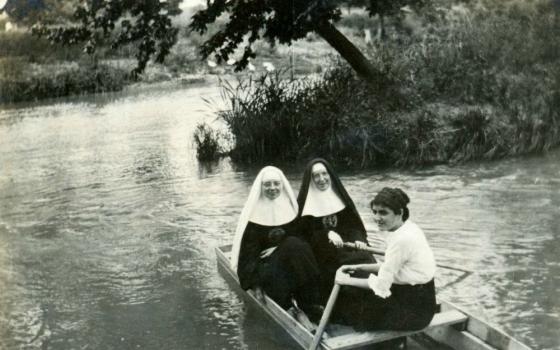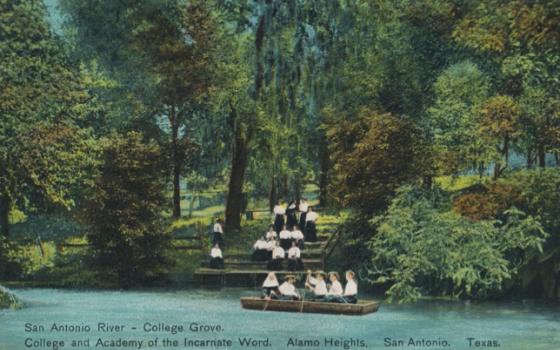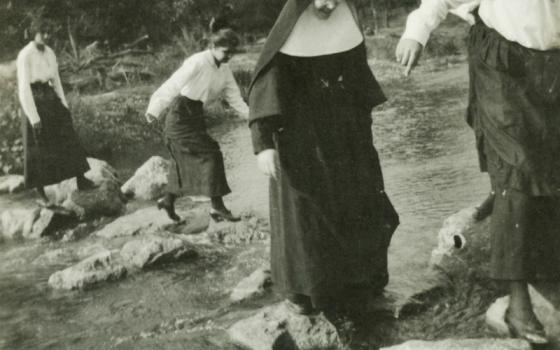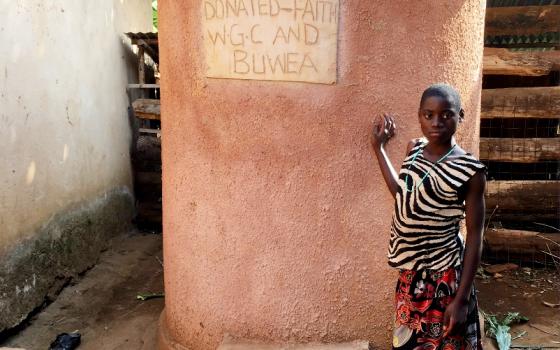In this Easter season, when we were blessed again with the waters of baptism, do we have eyes to see the sacredness of water? May we who have passed through the waters of baptism recognize that as our call to speak and work passionately so all in our global family may have clean water.
What if I had a day without water? No coffee, no toilet, no water to brush my teeth, no refreshing drink at the water fountain in the hall between classes, nothing to wash the dishes and the clothes — not to mention the dirt on my windshield — no water along the way as I bike a few miles, no water to make the soup for supper, no hot shower (not even a cold one).
I could endure a day, but what if I were a mother with small children in sub-Saharan Africa, where the deserts are increasing in size? Or what if I was one of the children I saw last summer in Chimbote, Peru, in a neighborhood without a clean water supply?
My heart was cracking open, and when I came home, I invited people in our city of San Antonio to be a part of the Global Water Dances movement, and join groups on six continents who are focusing on water issues.
We danced at the dry "Blue Hole."
Though my community, the Sisters of Charity of the Incarnate Word, did not have enough money in the late 1890s to purchase the land around the headwaters of the San Antonio River from Col. George Washington Brackenridge, they worked hard to raise money over a period of years. They believed that being close to nature is educationally beneficial and spiritually renewing. People need to learn of nature and learn to care for nature.
Abundant springs once bubbled up from the Edwards Aquifer, providing for the growing population and delighting sisters and students. The aquifer has been depleted and now the "Blue Hole," the largest of the springs considered sacred by the native peoples, is almost always dry.
This was the beginning of the San Antonio River and it has drawn people for over 11,000 years. When there are very heavy rains, some water may come up for a while, but then the hole is dry again.
World Water Day, observed annually on March 22, reminds us that 2.1 billion people live without safe drinking water at home, which affects their health, education and livelihoods.
Wars have been fought over power, land and oil. Now, life's most basic need — water — is causing escalating violence.
If we want a safe world, if we want a healthy world, now is the time to rally about the United Nations Sustainable Development Goal 6, and work together to ensure that everyone has access to safe water by 2030. Budgets for water have more potential to contribute to global security than budgets for weapons.
Because water easily comes out of your faucet now, don't forget that the city of Cape Town, South Africa, is due to run out of water this year. Its reservoirs are nearly dry.
Let us consider that we may be called to the spiritual discipline of learning where local water supplies come from, or following state and national legislation relating to water issues — and using our individual and corporate influence to advocate for the wise use of it.
The theme of World Water Day 2018 was "Nature for Water." Many problems like damaged ecosystems can be helped by nature-based solutions.
And working for water may call us to global solidarity.
Last year at the U.N. Commission on the Status of Women, we attended a session given by Lisa Uribe, director of Women's Global Connection — one of our sister's ministries. Lisa told a story about a girl in Tanzania who was often punished for being late to school, but she couldn't get there sooner because she had to carry water for her family.
Women's Global Connection started a rainwater-harvesting project to assist and encourage local women; now, there are 700 women in 60 villages harvesting rainwater. The little girl was profoundly grateful and could get to school more easily.
In the midst of the San Antonio metropolitan area of almost 2.5 million, our sisters are the guardians of a 53-acre nature sanctuary, the Headwaters at Incarnate Word. This nonprofit Earth care ministry seeks to increase biodiversity and benefit local wildlife, offers educational programs for adults and children, and provides a sanctuary where people are encouraged to reflect and reconnect with the Earth.
As we let the Earth restore us, we can be better at restoring the Earth.
As we renew our baptismal promises and reflect on the waters of our baptism, may we deepen in our commitment to ensure life-giving water for all.
[Martha Ann Kirk, a Sister of Charity of the Incarnate Word, is professor of religious studies at the University of the Incarnate Word, San Antonio, and the author of Iraqi Women of Three Generations: Challenges, Education, and Hopes for Peace, based on her exhibit of photos and interviews.]




